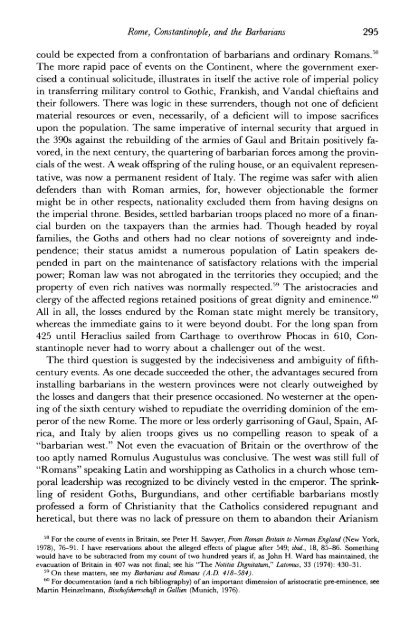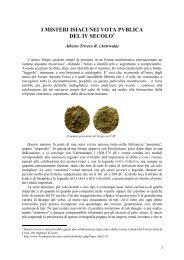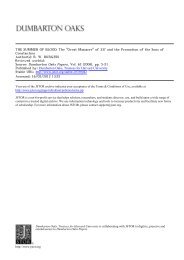Rome, Constantinople, and the Barbarians - Constantine the Great
Rome, Constantinople, and the Barbarians - Constantine the Great
Rome, Constantinople, and the Barbarians - Constantine the Great
Create successful ePaper yourself
Turn your PDF publications into a flip-book with our unique Google optimized e-Paper software.
<strong>Rome</strong>, <strong>Constantinople</strong>, <strong>and</strong> <strong>the</strong> <strong>Barbarians</strong> 295<br />
could be expected from a confrontation of barbarians <strong>and</strong> ordinary Romans.58<br />
The more rapid pace of events on <strong>the</strong> Continent, where <strong>the</strong> government exer-<br />
cised a continual solicitude, illustrates in itself <strong>the</strong> active role of imperial policy<br />
in transferring military control to Gothic, Frankish, <strong>and</strong> V<strong>and</strong>al chieftains <strong>and</strong><br />
<strong>the</strong>ir followers. There was logic in <strong>the</strong>se surrenders, though not one of deficient<br />
material resources or even, necessarily, of a deficient will to impose sacrifices<br />
upon <strong>the</strong> population. The same imperative of internal security that argued in<br />
<strong>the</strong> 390s against <strong>the</strong> rebuilding of <strong>the</strong> armies of Gaul <strong>and</strong> Britain positively fa-<br />
vored, in <strong>the</strong> next century, <strong>the</strong> quartering of barbarian forces among <strong>the</strong> provin-<br />
cials of <strong>the</strong> west. A weak offspring of <strong>the</strong> ruling house, or an equivalent represen-<br />
tative, was now a permanent resident of Italy. The regime was safer with alien<br />
defenders than with Roman armies, for, however objectionable <strong>the</strong> former<br />
might be in o<strong>the</strong>r respects, nationality excluded <strong>the</strong>m from having designs on<br />
<strong>the</strong> imperial throne. Besides, settled barbarian troops placed no more of a finan-<br />
cial burden on <strong>the</strong> taxpayers than <strong>the</strong> armies had. Though headed by royal<br />
families, <strong>the</strong> Goths <strong>and</strong> o<strong>the</strong>rs had no clear notions of sovereignty <strong>and</strong> inde-<br />
pendence; <strong>the</strong>ir status amidst a numerous population of Latin speakers de-<br />
pended in part on <strong>the</strong> maintenance of satisfactory relations with <strong>the</strong> imperial<br />
power; Roman law was not abrogated in <strong>the</strong> territories <strong>the</strong>y occupied; <strong>and</strong> <strong>the</strong><br />
property of even rich natives was normally respected.59 The aristocracies <strong>and</strong><br />
clergy of <strong>the</strong> affected regions retained positions of great dignity <strong>and</strong> eminence.'<br />
All in all, <strong>the</strong> losses endured by <strong>the</strong> Roman state might merely be transitory,<br />
whereas <strong>the</strong> immediate gains to it were beyond doubt. For <strong>the</strong> long span from<br />
425 until Heraclius sailed from Carthage to overthrow Phocas in 610, Con-<br />
stantinople never had to worry about a challenger out of <strong>the</strong> west.<br />
The third question is suggested by <strong>the</strong> indecisiveness <strong>and</strong> ambiguity of fifth-<br />
century events. As one decade succeeded <strong>the</strong> o<strong>the</strong>r, <strong>the</strong> advantages secured from<br />
installing barbarians in <strong>the</strong> western provinces were not clearly outweighed by<br />
<strong>the</strong> losses <strong>and</strong> dangers that <strong>the</strong>ir presence occasioned. No westerner at <strong>the</strong> open-<br />
ing of <strong>the</strong> sixth century wished to repudiate <strong>the</strong> overriding dominion of <strong>the</strong> em-<br />
peror of <strong>the</strong> new <strong>Rome</strong>. The more or less orderly garrisoning of Gaul, Spain, Af-<br />
rica, <strong>and</strong> Italy by alien troops gives us no compelling reason to speak of a<br />
"barbarian west." Not even <strong>the</strong> evacuation of Britain or <strong>the</strong> overthrow of <strong>the</strong><br />
too aptly named Romulus Augustulus was conclusive. The west was still full of<br />
"Romans" speaking Latin <strong>and</strong> worshipping as Catholics in a church whose tem-<br />
poral leadership was recognized to be divinely vested in <strong>the</strong> emperor. The sprink-<br />
ling of resident Goths, Burgundians, <strong>and</strong> o<strong>the</strong>r certifiable barbarians mostly<br />
professed a form of Christianity that <strong>the</strong> Catholics considered repugnant <strong>and</strong><br />
heretical, but <strong>the</strong>re was no lack of pressure on <strong>the</strong>m to ab<strong>and</strong>on <strong>the</strong>ir Arianism<br />
58 For <strong>the</strong> course of events in Britain, see Peter H. Sawyer, From Roman Britain to Norman Engl<strong>and</strong> (New York,<br />
1978), 76-91. I have reservations about <strong>the</strong> alleged effects of plague after 549; ibid., 18, 85-86. Something<br />
would have to be subtracted from my count of two hundred years if, as John H. Ward has maintained, <strong>the</strong><br />
evacuation of Britain in 407 was not final; see his "The Notitia Dignitatum," Latomus, 33 (1974): 430-31.<br />
59 On <strong>the</strong>se matters, see my <strong>Barbarians</strong> <strong>and</strong> Romans (A.D. 418-584).<br />
' For documentation (<strong>and</strong> a rich bibliography) of an important dimension of aristocratic pre-eminence, see<br />
Martin Heinzelmann, Bischofsherrschaft in Gallien (Munich, 1976).







